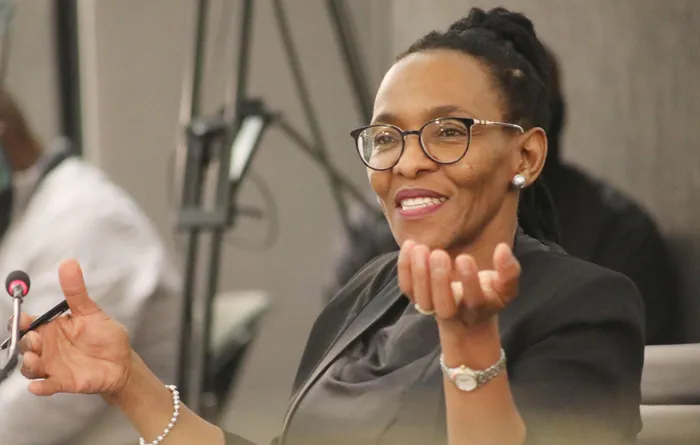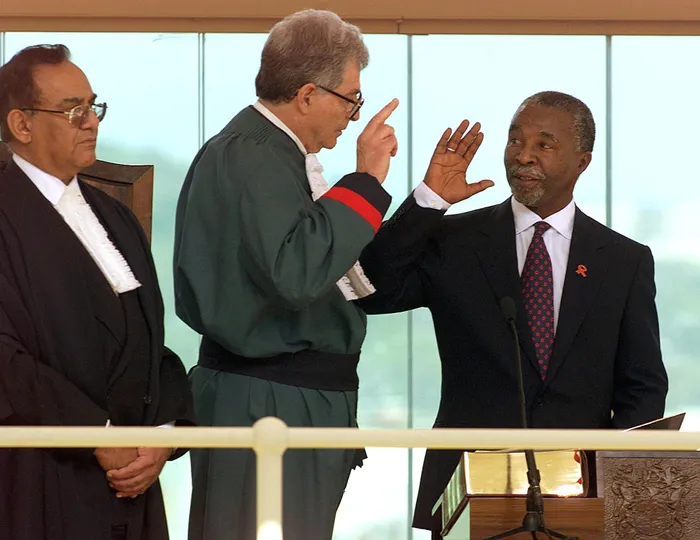Constitutional Court: Champion of the People or Protector of the Elite?

South Africa's first woman Chief Justice and the head of the Constitutional Court Mandisa at her interview with the Judicial Services Commission on February 2, 2022.
Image: Timothy Bernard/African News Agency(ANA)
Kim Heller
The thirty-year-old Constitutional Court is a living shrine to the supreme pledge of equality and justice in democratic South Africa.
The real test of the highest court in the land is whether it is an effectual guardian of the people, especially of the most powerless and marginalised in society.
In the injustice of apartheid, courts accorded legality to an inhumane regime and the judiciary was weaponised against the African majority. In democratic South Africa, justice must be done and seen to be done so that the historically disempowered can believe in the promise of a free and equitable nation.
Early landmark judgments in the Constitutional Court affirmed the right of citizens to access life-saving HIV treatment, adequate water and housing. These judgements created an air of optimism that the apex court would be a faithful chamber of justice for ordinary South Africans.
Another important victory for citizens was the Constitutional Court's ruling that permits civil rights organisations and individuals to present cases before it.
However, the vital mission of safeguarding citizens' rights and improving fair access to justice has been frustrated by the sluggish enactment of crucial judgments on socio-economic rights, impaired state capacity, and a lack of government accountability. Recent entanglements of the Court in political wars have also negatively affected its standing and trustworthiness.
The 2021 Constitutional Court's sentencing of former President Jacob Zuma to fifteen months in prison for contempt of Court without a criminal trial was celebrated by many of his political opponents. Amidst this cheer from his rivals, many ordinary South Africans saw this ruling as an ominous political weaponisation of the judiciary and a wretched betrayal of justice. Fury mounted, people protested, and over three hundred were killed in one of the worst outbreaks of civil turmoil in democratic South Africa.
President Cyril Ramaphosa's Phala Phala matter was a case that tested the Constitutional Court's impartiality. After a Parliamentary Section 89 panel found prima facie evidence of misconduct by the President, he approached the Constitutional Court to review and set aside the panel's report.
Ramaphosa's bid was dismissed, and the President was duly directed to the High Court. Many hailed this as an expression of equality before the law in South Africa. A grand show of exercising justice without fear or favour. Few wanted to recognise this as a potentially cowardly act driven by a fear of ruling on such a sensitive matter involving the first citizen of the country.
The long delay by the Constitutional Court in delivering a judgment on the EFF and ATM's challenge to the National Assembly's decision not to act on the Section 89 panel findings raises concerns about the court's impartiality, constitutional accountability, and the burning issue of delaying justice.
Politically charged, expedient legal judgements set a dangerous precedent for any court of law. The contamination of a single judgement can cast doubt over the entire body of good work done by the Constitutional Court and forever tarnish its standing as an independent legal organ. When legal precepts are sacrificed on the altar of political expediency, no one wins.
Justice Edwin Cameron has spoken of how the legitimacy of the judiciary rests on the faith of ordinary people that "judges will protect the weak against the strong" and "the poor against the powerful."
Research conducted by the Institute for Justice and Reconciliation (IJR) in 2023 showed that trust in the Constitutional Court had plummeted by over 20% since 2007. This decline is echoed in Stats SA’s 2023 data, which revealed that trust in the judiciary was falling "consistent with wider patterns of disillusionment in state institutions."
The IJR notes that "South Africans are increasingly seeing the judiciary as part of an elite compact that does not serve their interests".
The responsibility of the Constitutional Court in democratic South Africa is monumental, given the country's history of racial oppression and lingering structural inequality.
Access to justice is a cardinal pillar of democracy and essential to the Constitutional promise of equality for all. Former Deputy Chief Justice Dikgang Moseneke wrote how courts must never evade their responsibility as agencies of change. Justice Albie Sachs spoke of how constitutionalism is not about fine words on paper but that it is about the living pulse of justice in people's lives.

Then South African President Thabo Mvuyelwa Mbeki is sworn in as President of the Republic of South Africa by the President of the Constitutional Court Justice Arthur Chaskalson (C) and Chief Justice Ismail Mohammed (L) at the Union Buildings in Pretoria, 16 June 1999.
Image: AFP
Transformative constitutionalism places the judiciary at the forefront of addressing structural inequality and fostering a new compact of social parity.
However, the chasm between the lofty promises of the Constitution and the everyday injustices that still plague the majority of South Africans is vast.
The real work and true triumphs of the Constitutional Court lie in delivering justice to the poor and marginalised by helping to dislodge inequality rather than perpetuate it.
If it is to be a guard dog of elites rather than a guardian of the people, its promise will fade as surely as the Rainbow Nation itself.
In an interview with City Press in 2020, Dr Muzi Sikhakhane SC spoke about how justice needs to be accessible to all rather than being the exclusive preserve of those who are experts in navigating the complexities of law.
As the Constitutional Court steers its future it must avoid becoming a faraway fortress or an exclusive carriage of legal privilege. Extensive outreach programmes on legal rights and legal access would help boost it as an organ of people's power.
The inclusion of African languages as languages of record in all courts across South Africa, including the apex court, is imperative if justice is to be done.
Justice Albie Sachs spoke of how we do not want our Constitution to be “a castle for the rich and powerful” and how rather we want it to be a refuge for the poor and marginalised. Our expectations of the judiciary may be too high.
After all, the rule of law is not a precise science. Nor is it a godly creation or a holy piece of art. It is but the handiwork of men and women flawed by their specific biases, interests, and life orientations. The Constitutional Court, like our fragile democracy, is a work in progress.
* Kim Heller is a political analyst and author of No White Lies: Black Politics and White Power in South Africa.
** The views expressed do not necessarily reflect the views of IOL, Independent Media or The African.